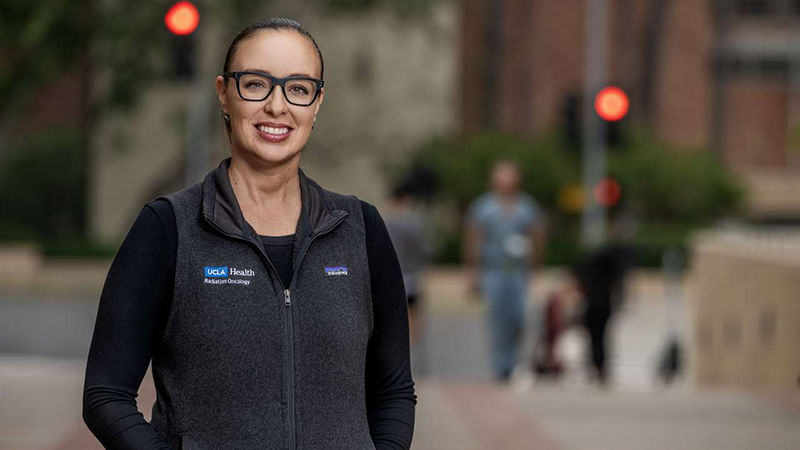Kayla Kafka-Peterson on bringing oncology nursing training to the world
Share This Article

By Jennifer Karmarkar, UCLA Health
Brachytherapy is a targeted, high dose of radiation delivered internally to treat cancers. Although UCLA Health has one of the leading programs in the world for this treatment, it’s something that few people – including those in the health care field – know much about.
Kayla Kafka-Peterson, BSN, R.N., is on a mission to change that.
Kafka-Peterson, a radiation oncology supervisor, provides program oversight for the UCLA Brachytherapy Division (Link opens in new window) at UCLA Health. She started in the department as a clinical nurse in 2012 and has since moved to a managerial role.
The department performs brachytherapy throughout the health care system.
“We have ORs, lots of anesthesia cases; we do pre-op, intra-op, post-op, and care for ambulatory to ICU-level patients,” Kafka-Peterson says. “We care for patients with HDR (high dose rate) brachytherapy implants in place.”
What they didn’t have – in fact, what nobody in health care seemed to have – was brachytherapy training or onboarding materials for nurses.
“Throughout the world, for the treatment we do, there was no nursing content, resources, guidance or education for nurses. It was all geared toward doctors and physicists,” she says. “Despite this treatment being an established cancer treatment, there was nothing to train nurses with and no best practices.”
Making an impact
As a supervisor, Kafka-Peterson maintains case schedules to ensure they align with the radiation and chemo schedules, facilitates preoperative medical and cardiac clearances, manages staffing and resources, develops policies and procedures, and provides education throughout the health care system.
Out of necessity, she developed her own extensive brachytherapy training program for her team and for the inpatient units caring for brachytherapy patients, but she knew she could make a bigger impact. A few years ago, she reached out to the American Brachytherapy Society (ABS) and was given the green light to develop the first-ever educational resources on the organization’s website.
In the past year, this educational endeavor has expanded further, with Kafka-Peterson being an invited speaker with the International Gynecologic Cancer Society (IGCS), the ABS/GEC-ESTRO World Congress, and the Oncology Nursing Society. She also has several talks and webinars lined up for the remainder of 2024 and into 2025.
“People are incredibly grateful that brachytherapy nursing education is becoming available,” Kafka-Peterson says. “Available education is mostly for physicians and physicists, but we are changing that and providing better access to educational materials for nurses throughout the world.”
In 2022, Kafka-Peterson was asked to head up the ABS’s inaugural nursing symposium. Held virtually, the event drew 125 people from five continents and was the world’s first live educational event held exclusively for brachytherapy nurses.
“We had some great guest speakers, and it was an overwhelming success,” she says. “It was the first of many symposiums to come.”
In 2023 and 2024, Kafka-Peterson has helped form, and chairs, the Brachytherapy Nursing/Dosimetry/Radiation Therapist Council through ABS, the first of its kind in the world. The goal of the council is to start discussions, network, create educational resources and begin establishing best practices.
Kafka-Peterson was honored for her work in 2023 as one of 30 nurses – 10 from UCLA Heath – to be celebrated in the first year of the Simms/Mann Family Foundation’s Off the Chart program (Link is external and opens in new window), which recognizes nursing excellence.
She calls the award “an amazing shout-out.”
“It was an unexpected, incredibly gracious honor that spotlights all the amazing things nurses are doing everywhere,” she said. “Coming out of a period when being a nurse manager has been challenging, tiring and stressful (due to the COVID-19 pandemic), to have this nice award and nurses being recognized is so uplifting. It makes me proud to be a nurse.”
Finding her niche
As much as she now loves it, nursing wasn’t Kafka-Peterson’s first choice when she entered the University of Iowa.
“I originally was going the medicine route,” she says. “I knew I liked science, and I didn’t know any nurses. I took a personality job quiz at the career center, and everything pointed to nursing. I discovered Iowa had a great nursing program, and I switched from pre-med and enrolled the next semester.”
Kafka-Peterson now has found her niche teaching others.
Along with her duties in her department, Kafka-Peterson is working on multiple events for the ABS, IGCS, and several nonprofits globally that all have an interest in brachytherapy nursing education. As a member of ABS’s global council, she is also helping lead an African access initiative to educate nurses throughout Africa on how to care for brachytherapy patients.
“Over the years, I’ve developed a lot of training, but being able to do it globally is an honor,” she says. “You do it to help the greater group of nurses, and I’ve gone from really enjoying my job to tapping into something much greater, which has been very fulfilling. I thank UCLA and my leadership team for their ongoing encouragement and support.”
She also consults with hospitals throughout the U.S. to help them train their staff on brachytherapy and to help physicians and leaders maximize team efficiency and clinical flow.
Her advice to new nurses: Start broad, work on critical skills, and as you gain more experience, zero in on what makes you excited.
“You don’t have to stay in one field,” Kafka-Peterson advises. “You can find what makes you feel the most excited and alive, and then pursue it with everything you have.”
